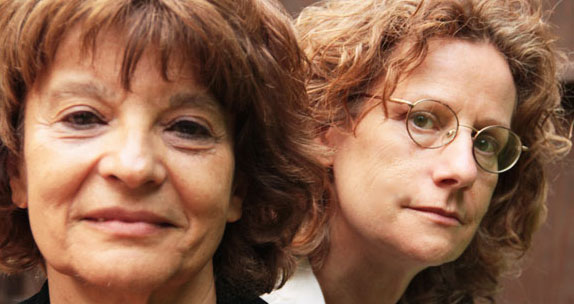
Filmmaking duo Marion Lipschutz and Rose Rosenblatt are no strangers to reproductive rights-themed documentaries. Their award-winning work includes Live Free or Die (POV, 2000), about a New Hampshire OB-GYN on the frontlines of the “abortion wars, and The Education of Shelby Knox (POV, 2005), about a teenage girl campaigning for sex education in a conservative school district with high teen pregnancy rates. Their new film is a natural progression from these other compelling stories: Young Lakota also features a strong-minded young woman [read our interview with Sunny Clifford here] who finds herself at the center of political controversy on South Dakota’s Pine Ridge Reservation.
We checked in with Rose and Marion to learn more about what brought them to make this film, which premieres on Independent Lens tonight, Monday November 25, at 10 PM on PBS (check local listings).
When you came to South Dakota for the debate over the family planning clinic, how did you first encounter Sunny and the other two young adults? What made you think they would be interesting focus for a documentary?
Marion: The road to finding this story was not direct. We were on the Pine Ridge Reservation to follow Lavetta Elk, a young woman suing a U.S. army recruiter for a sexual assault. At the time, her story was in a lull. Concurrently, Cecelia Fire Thunder challenged South Dakota’s abortion ban with a threat to build a clinic on the sovereign territory of the reservation, and all hell broke loose. When one of Cecelia’s opponents tipped us off about a surprise protest at the next Tribal Council meeting to call for her impeachment, we had to show up. So did Sunny, Serena and Brandon. The rest is history.
You’ve made an array of human rights-themed documentaries before this one. But did you have an interest in Native American affairs before landing on this? How much time did you spend staying/living on the reservation when making this film?
Marion: With a history of making films on reproductive health, rights, and justice, and a particular focus on out of the way places, we were first drawn to the issues, secondarily to the setting. Once there, we discovered a rich and wonderful place. We went there approximately 12 times, sometimes for over a week, other times for a few days to cover a key event.
How did you gain the trust of the young adults featured in your film?
By sticking around! Any initial mistrust vanished, as it always seems to, with persistence, good manners, and good intentions.
Have you kept in touch with Sunny, Brandon, and/or Serena since the film’s completion?
Marion: Once we make a film about someone they’re with us for life. We’ve been more closely in touch with Sunny as she’s been most involved with the engagement work around the film. We are more sporadically in touch these days with Serena and Brandon.
Do you think Young Lakota has led or will lead to discussion and evolution on the subject of women’s rights, on Native American reservations? Have you gotten any interesting feedback from Pine Ridge or any other reservation or tribe after they’ve seen the film?
Rose: This film has lead to a robust discussion of themes centering around reproductive rights and justice. We have screened in many communities across the country as well as in festivals, both native and mainstream, and the response has been overwhelmingly positive. We’ve been especially delighted that when we play for Native audiences they get all the small jokes and nuances, and have heard, again and again, that we got it right. Many activists working in the reproductive justice field have expressed their interest in using the film in their work to raise awareness and inspire a new generation of activists.
People have also said that while much has been said of the bleakness of the place, the film doesn’t dwell on images of it. The young people in the film have watched it, and were surprised to see earlier versions of themselves, on the way to becoming who they are today. Cecelia Fire Thunder, whose impeachment is the inciting event of the film, said that seeing, and presenting Young Lakota, has been a profoundly healing experience for her.
As a filmmaking duo, how do you delegate “tasks” when producing a film, do you share the same duties, or do each of you have your strengths and favorite things to handle?
Rose: We do a bit of both; we obviously have different strengths and so Marion will often take more of the front end (development, writing) and I more of the back end (editing). We come together during production. Co-directing is the most fluid part of our partnership, an area where our instincts and styles synchronize in formulating the shape and content of the film. When we disagree, we arm wrestle, have temper tantrums, and finally work out a solution we are both happy with.
What are your three favorite films?
Marion: Blazing Saddles, Raising Arizona, Grand Illusion.
Rose: 8½, Jules & Jim, Badlands.
What advice do you have for aspiring filmmakers?
Marion: Only do it if you can’t stop yourself.
Rose: Work only with people you admire.
What projects are you working on next?
Rose: We are in production on a film called Simple Justice: The Case of Bei Bei Shuai, Bei Bei Shuai, a Chinese immigrant, was arrested and charged with murder and attempted feticide. Her attorney, Linda Pence, is facing the fight of her life; a case that has grown to epic proportions, encompassing questions of legal precedents, personhood laws, mental health, and immigration issues. Simple Justice will take viewers behind the scenes, weaving an intimate, personal story with the dramatic intensity of a high stakes criminal case. This will be the third film in a series that began with The Education of Shelby Knox, and is followed by Young Lakota.
Trailer for Young Lakota:
